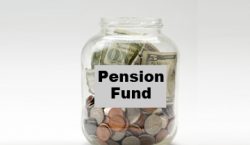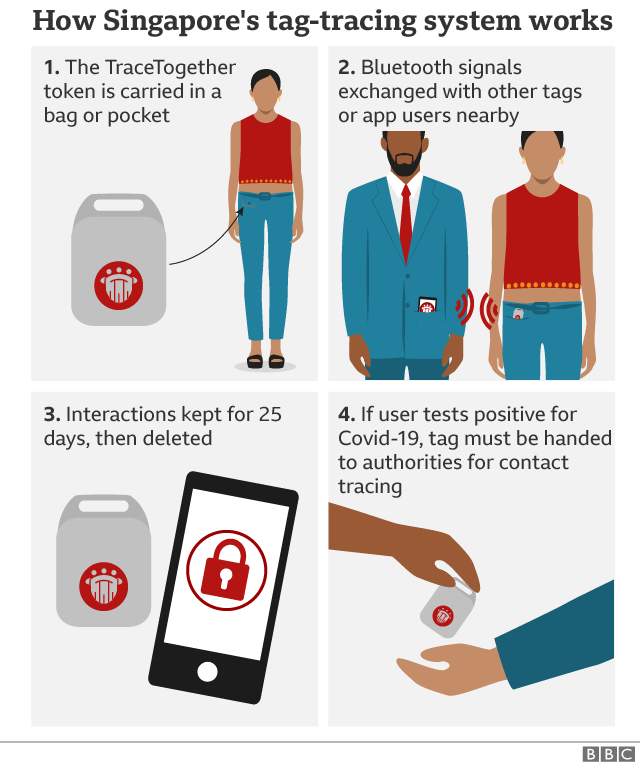

Singapore has admitted data from its Covid contact tracing programme can also be accessed by police, reversing earlier privacy assurances.
Officials had previously explicitly ruled out the data would be used for anything other than the virus tracking.
But parliament was told on Monday it could also be used “for the purpose of criminal investigation”.
Close to 80% of residents are signed up to the TraceTogether programme, which is used to check in to locations.
The voluntary take up increased after it was announced it would soon be needed to access anything from the supermarket to your place of work.
The TraceTogether programme, which uses either a smartphone app or a bluetooth token, also monitors who you have been in contact with.
If someone tests positive with the virus, the data allows tracers to swiftly contact anyone that might have been infected. This prompted concerns over privacy – fears which have been echoed across the world as other countries rolled out their own tracing apps.
To encourage people to enrol, Singaporean authorities promised the data would never be used for any other purpose, saying “the data will never be accessed, unless the user tests positive for Covid-19 and is contacted by the contact tracing team”.
But Minister of State for Home Affairs Desmond Tan told parliament on Monday that it can in fact also be used “for the purpose of criminal investigation”, adding that “otherwise, TraceTogether data is to be used only for contact tracing and for the purpose of fighting the Covid situation”.


However, the privacy statement on the TraceTogether site was then updated on the same day to state that “the Criminal Procedure Code applies to all data under Singapore’s jurisdiction”.
“Also, we want to be transparent with you,” the statement reads. “TraceTogether data may be used in circumstances where citizen safety and security is or has been affected.
“The Singapore Police Force is empowered under the Criminal Procedure Code (CPC) to obtain any data, including TraceTogether data, for criminal investigations.”
On Tuesday, the country’s Minister for Foreign Affairs, Vivian Balakrishnan, clarified that it was not just TraceTogether data that was used in cases of serious criminal investigations.
He said under the CPC, “other forms of sensitive data like phone or banking records” would also have their privacy regulations overruled in such cases.
Mr Balakrishnan added that to his knowledge, police had so far only once accessed contact tracing data, in the case of a murder investigation.
The minister stressed though that “once the pandemic is over and there will no longer be a need for contact tracing, we will happily stand down the TraceTogether programme.”
Monday’s announcement though sparked some controversy on social media, with people calling out the government and some users posting that they had now deleted the app.
“I’m disappointed, but not at all surprised,” local journalist and activist Kirsten Han told the BBC. “This is actually something that I’ve been flagging as a concern since the earlier days of TraceTogether – and was sometimes told that I was just a paranoid fearmonger undermining efforts to fight Covid-19.
“It doesn’t feel good at all to discover I was right.”
“I think why most people are so angry about this is not that they feel like they’re constantly being watched,” one Singaporean, who did not want to be named, told the BBC. “We already have that through other means like CCTV.
“It’s more that they feel like they’ve been cheated. The government had assured us many times that TraceTogether would only be used for contact tracing, but now they’ve suddenly added this new caveat.”
Another person told the BBC they wished they could delete the app, but daily life would be impossible without it.
“So I’m just going to disable my Bluetooth for TraceTogether from now on, unless I have to use it to enter somewhere. If the app is not only going to be used for contact tracing, then it’s too much of an invasion of privacy.”
Australian privacy watchdog Digital Rights Watch, told the BBC they were “extremely concerned” about the news from Singapore.
“This is the worst case scenario that privacy advocates have warned about since the start of the pandemic,” Programme Director Lucie Krahulcova told the BBC. “Such an approach will erode public trust in future health responses and therefore impede their efficacy.”
Like most countries, Australia has rolled out its own contact tracing app but uptake has been sluggish precisely because of privacy concerns.
Singapore was among the first countries to introduce a contact tracing app nationally in March last year.
The introduction of the token in June had sparked a rare backlash against the government over concerns the device would be mandatory. An online petition calling for it to be ditched has gathered some 55,000 signatures so far.
Singapore has been been one of the most successful countries in tackling the pandemic. Despite a big outbreak among its foreign workers early on, local infection rates have for months been close to zero. – bbc.com